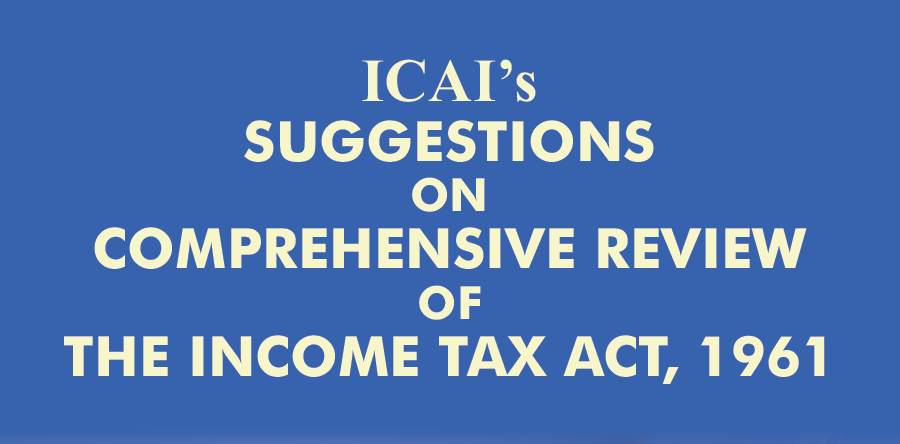ICAI’s Recommendations to CBDT for Simplifying the Income-Tax Act: A Step Towards Better Compliance and Reduced Litigation

CA Tarun Garg | Updated on: Jan 7th, 2025 | 3 min read
Introduction
The Union Budget 2024-25 marked a pivotal moment in India’s taxation history, as it emphasized the need for a comprehensive review of the Income-Tax Act, 1961. This monumental legislation has governed Indian taxation for over six decades but is now in urgent need of modernization to align with current economic realities and simplify compliance.
The Institute of Chartered Accountants of India (ICAI) has taken a leading role in this effort, submitting detailed recommendations to the Central Board of Direct Taxes (CBDT). These suggestions aim to simplify tax laws, mitigate litigation, and reduce compliance burdens for taxpayers. Let’s dive into ICAI’s extensive proposals and their potential impact.
ICAI’s 4 Key Areas of Recommendations
ICAI’s recommendations focus on the following categories:
- Simplification of tax laws.
- Removal of obsolete provisions.
- Mitigation of litigation.
- Reduction of compliance burdens.
Below is an in-depth analysis of these categories.
1. Simplification of Tax Laws
1.1 Tax Rate Consolidation
ICAI has recommended that tax rates be consolidated either:
- Directly in the relevant sections of the Income-Tax Act.
- Exclusively in a dedicated schedule, eliminating the current split between the Act and the Finance Act.
1.2 Streamlining Definitions
The current law contains numerous inclusive definitions, leading to misinterpretations. ICAI suggests:
- Exhaustive definitions for terms like “income” (Section 2(24)) and “business” (Section 2(13)).
- Avoiding “exclusions to exclusions,” such as in the definition of “capital assets” under Section 2(14).
1.3 Residential Status Simplification
Determining an individual’s residential status under Sections 6(1) and 6(6) is overly complex. ICAI recommends basing the determination solely on the number of days spent in India during the current year and prior years.
1.4 Unified Tax Regime (Section 115BAC)
ICAI suggests:
- Making the concessional tax regime under Section 115BAC the default and only regime for individuals and HUFs.
- Removing the option to alternate between regimes, which creates administrative challenges.
1.5 Simplified Tax Compliance for Firms and LLPs
Introduce a concessional tax regime similar to companies for firms and LLPs. This will encourage formalization and simplify tax filings.
2. Removal of Obsolete Provisions
2.1 Redundant Deduction Sections
ICAI recommends removing Sections 30 and 31, as business-related expenses like rent, repairs, and insurance are already covered under the broader Section 37(1).
2.2 Depreciation Rules
Depreciation rates in the Income-Tax Act should align with the Companies Act, 2013. This simplifies compliance for companies and eliminates the need for separate depreciation schedules.
2.3 Obsolete Chapters and Subsections
ICAI identified several chapters and clauses that are outdated and irrelevant, advocating their removal to declutter the Act.
3. Mitigation of Litigation
3.1 Standardization of Provisions
ICAI emphasizes uniformity in provisions across sections to avoid confusion and litigation. For example:
- Sections 54 to 54F: These sections offer capital gains exemptions but differ in their language and conditions, leading to unnecessary disputes.
3.2 Consistency in Defining Income
Income definitions in Section 2(24) vary, with some income types described directly and others referenced indirectly through clauses. This inconsistency can lead to litigation.
3.3 Clarification of Key Concepts
Ambiguities in terms like “business” and “profession” (Sections 2(13) and 2(36)) should be clarified to reduce misinterpretation and disputes.
3.4 Aligning with Judicial Precedents
ICAI recommends that the CBDT adopt binding court judgments to avoid unnecessary appeals and improve administrative efficiency.
4. Reduction of Compliance Burden
4.1 Simplified Tax Returns
- Reintroduce a single-page SARAL form for individual taxpayers.
- Reduce redundant schedules in ITR forms, particularly for individuals and small businesses.
4.2 Permanent Registration for Trusts
Charitable trusts currently need to renew their registration every five years under Sections 12A and 12AB. ICAI suggests permanent registration, reducing paperwork and administrative overhead.
4.3 Threshold-Based Exemptions for Small Trusts
Trusts with annual receipts of up to ₹5 crore should be exempt from cumbersome compliance under Sections 11 to 13.
4.4 Elimination of ICDS Compliance
The Income Computation and Disclosure Standards (ICDS) create additional compliance burdens for taxpayers. ICAI recommends eliminating ICDS to align taxable income with accounting standards.
Potential Benefits of ICAI’s Recommendations
1. Boost to Ease of Doing Business
Simplified tax laws reduce compliance costs and attract more businesses to formalize their operations.
2. Reduced Litigation
By addressing ambiguities and inconsistencies in tax laws, disputes between taxpayers and authorities can be minimized.
3. Enhanced Taxpayer Confidence
Transparent and consistent tax policies foster trust among taxpayers, encouraging voluntary compliance.
4. Streamlined Administration
A unified and simplified tax framework eases the burden on tax authorities, allowing them to focus on high-priority cases.
Conclusion
ICAI’s comprehensive recommendations for the Income-Tax Act, 1961, reflect a well-thought-out roadmap toward a simpler, more efficient, and taxpayer-friendly tax system. If implemented, these changes can significantly enhance compliance, reduce litigation, and ensure fairness in taxation.
Click here to read the complete suggestion given by ICAI to CBDT to reform the Income Tax Act.
As we await the next steps from the CBDT, stay tuned to QuickComply for the latest updates and expert insights on Indian tax reforms.
About Author

Name: CA Tarun Garg
Qualification: CA, CS, B.Com
Company: T Garg & Co.
Mobile: +91-9999147621
Email: Tarun.garg@mail.ca.in
Location: New Delhi
Let’s Connect!
Popular Articles
Trusted By Your Favorite Brands






